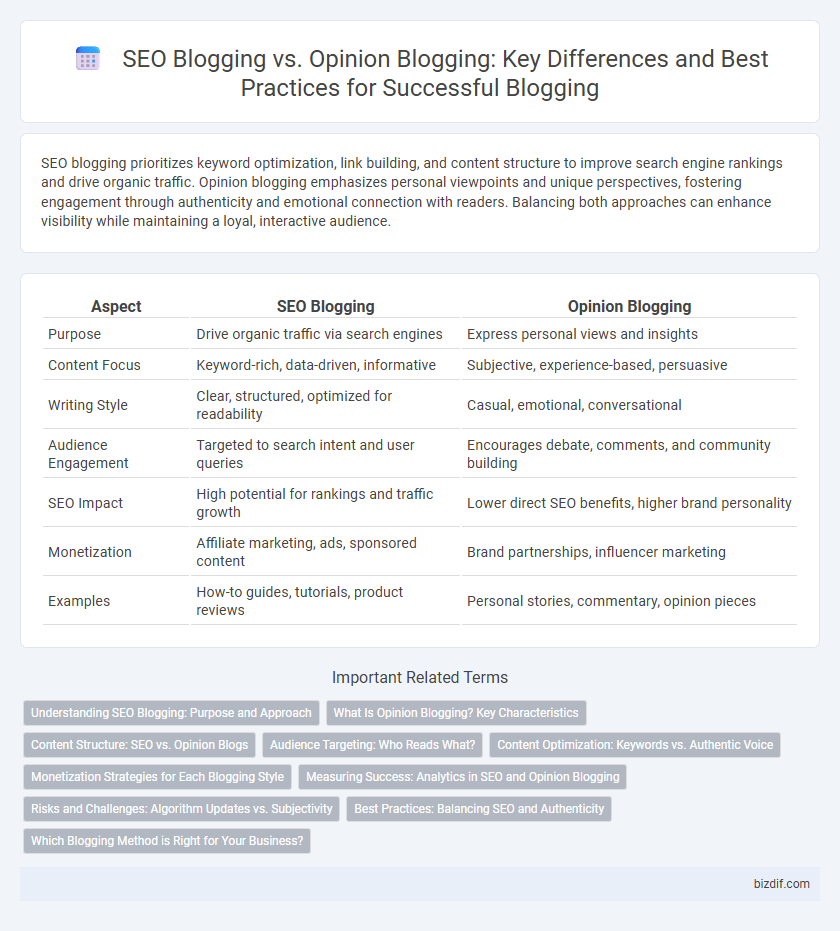SEO blogging prioritizes keyword optimization, link building, and content structure to improve search engine rankings and drive organic traffic. Opinion blogging emphasizes personal viewpoints and unique perspectives, fostering engagement through authenticity and emotional connection with readers. Balancing both approaches can enhance visibility while maintaining a loyal, interactive audience.
Table of Comparison
| Aspect | SEO Blogging | Opinion Blogging |
|---|---|---|
| Purpose | Drive organic traffic via search engines | Express personal views and insights |
| Content Focus | Keyword-rich, data-driven, informative | Subjective, experience-based, persuasive |
| Writing Style | Clear, structured, optimized for readability | Casual, emotional, conversational |
| Audience Engagement | Targeted to search intent and user queries | Encourages debate, comments, and community building |
| SEO Impact | High potential for rankings and traffic growth | Lower direct SEO benefits, higher brand personality |
| Monetization | Affiliate marketing, ads, sponsored content | Brand partnerships, influencer marketing |
| Examples | How-to guides, tutorials, product reviews | Personal stories, commentary, opinion pieces |
Understanding SEO Blogging: Purpose and Approach
SEO blogging centers on creating content tailored to improve search engine rankings by integrating targeted keywords, optimizing meta tags, and ensuring valuable, relevant information for users. Its primary purpose is to drive organic traffic through strategic content planning and technical SEO practices, unlike opinion blogging, which prioritizes personal viewpoints and engagement. This approach requires consistent keyword research, analysis of search intent, and adherence to SEO guidelines to enhance visibility and audience reach effectively.
What Is Opinion Blogging? Key Characteristics
Opinion blogging centers around expressing personal viewpoints and subjective interpretations rather than solely providing factual information or optimized content for search engines. Key characteristics include a distinct author voice, emotional engagement, and the use of persuasive language aimed at influencing readers' beliefs or sparking discussion. Unlike SEO blogging, opinion blogging prioritizes authenticity and individual perspective over keyword density and search rankings.
Content Structure: SEO vs. Opinion Blogs
SEO blogging prioritizes keyword integration, meta tags, and structured headings to enhance search engine rankings and drive organic traffic. Opinion blogging centers around personal voice and narrative flow, with a flexible structure that emphasizes authenticity and reader engagement. The content structure in SEO blogs is strategically optimized for algorithms, whereas opinion blogs favor emotional connection and unique perspectives.
Audience Targeting: Who Reads What?
SEO blogging targets users searching for specific information or solutions, attracting a broad audience seeking clarity, how-tos, and keyword-rich content. Opinion blogging appeals to niche groups interested in unique perspectives, personal experiences, and subjective viewpoints, often fostering engaged communities around particular topics or beliefs. Understanding these audience differences helps bloggers tailor content strategies to either maximize reach or deepen reader loyalty.
Content Optimization: Keywords vs. Authentic Voice
SEO blogging prioritizes content optimization through strategic keyword integration to enhance search engine rankings and increase organic traffic. Opinion blogging emphasizes an authentic voice, fostering genuine engagement and building trust without strict reliance on keyword density. Balancing targeted keywords with a unique personal tone can maximize visibility while maintaining reader connection.
Monetization Strategies for Each Blogging Style
SEO blogging capitalizes on targeted keyword research and technical optimization to attract high-volume organic traffic, enabling effective monetization through affiliate marketing, sponsored content, and ad placements. Opinion blogging emphasizes personal voice and niche audience engagement, facilitating monetization via direct fan support, exclusive content subscriptions, and brand partnerships tailored to loyal followers. Monetization strategies vary significantly with SEO blogs relying on scalable traffic-driven income, while opinion blogs leverage audience trust and community-building for revenue generation.
Measuring Success: Analytics in SEO and Opinion Blogging
SEO blogging success is measured by metrics such as organic traffic, keyword rankings, bounce rate, and conversion rates tracked through tools like Google Analytics and Search Console. Opinion blogging relies on engagement indicators including comments, shares, social media reactions, and sentiment analysis to gauge audience connection and influence. Analyzing these distinct data sets enables bloggers to tailor content strategies for enhanced visibility or community impact.
Risks and Challenges: Algorithm Updates vs. Subjectivity
SEO blogging faces significant risks from frequent algorithm updates by search engines like Google, which can dramatically impact traffic and rankings. Opinion blogging, while less affected by algorithm changes, encounters challenges related to subjectivity and potential audience polarization, making consistent engagement unpredictable. Balancing SEO strategies with authentic voice is crucial to mitigate these risks in both blogging styles.
Best Practices: Balancing SEO and Authenticity
SEO blogging requires strategically integrating targeted keywords, meta descriptions, and backlinks to enhance search engine rankings, while opinion blogging centers on authentic voice and personal narratives that engage readers emotionally. Best practices involve blending keyword optimization with genuine insights, ensuring content remains both discoverable through search algorithms and relatable to the audience. Maintaining transparency and avoiding keyword stuffing preserves credibility and fosters long-term reader trust.
Which Blogging Method is Right for Your Business?
SEO blogging focuses on creating content rich in targeted keywords to drive organic traffic and improve search engine rankings, making it ideal for businesses seeking measurable growth and lead generation. Opinion blogging emphasizes personal insights and unique perspectives, fostering deeper audience engagement and brand personality, suitable for businesses aiming to build loyal communities and thought leadership. Choosing the right blogging method depends on your business goals--prioritize SEO blogging for scalability and customer acquisition, or opinion blogging for brand differentiation and authenticity.
SEO Blogging vs Opinion Blogging Infographic

 bizdif.com
bizdif.com